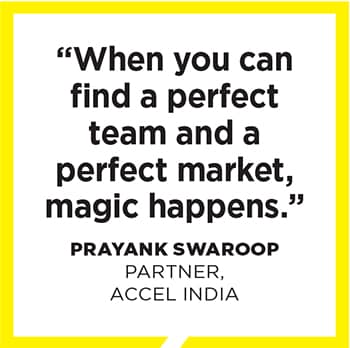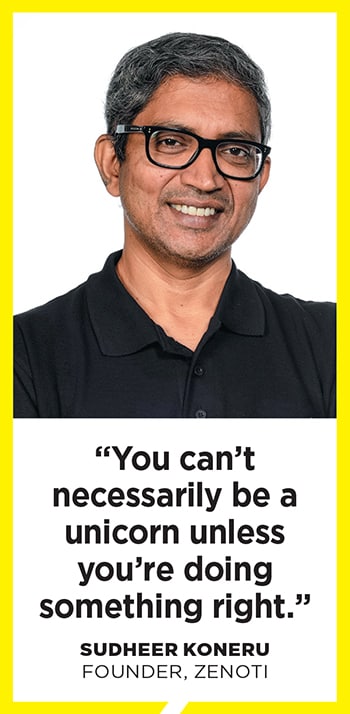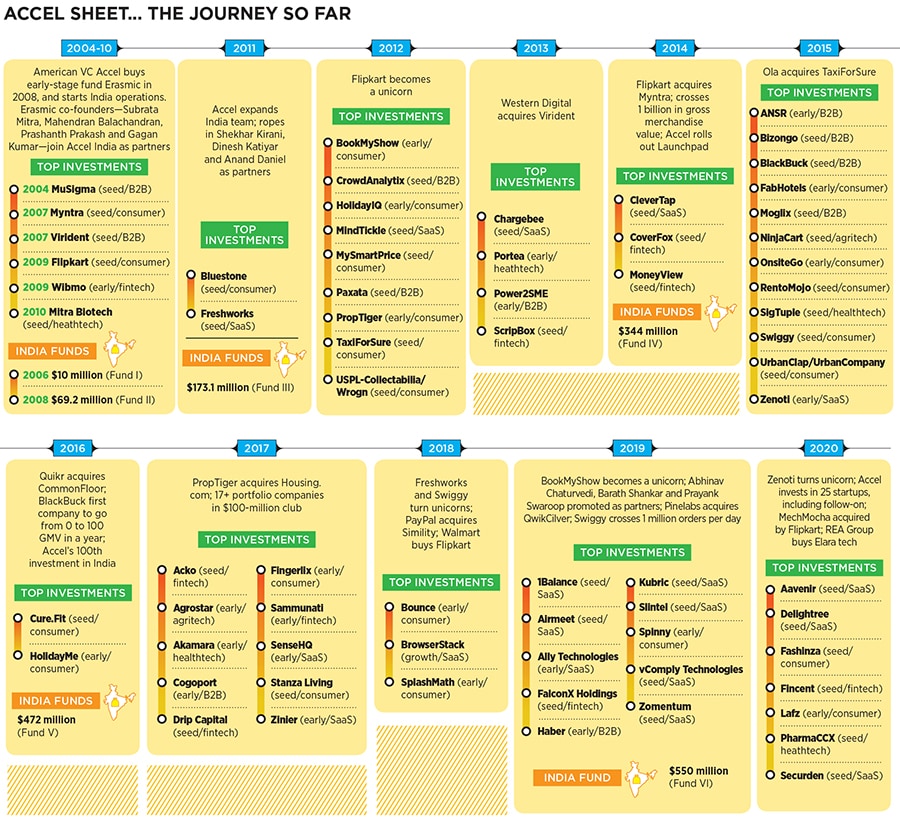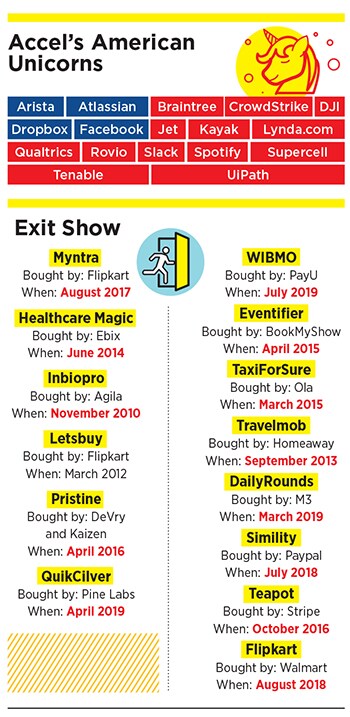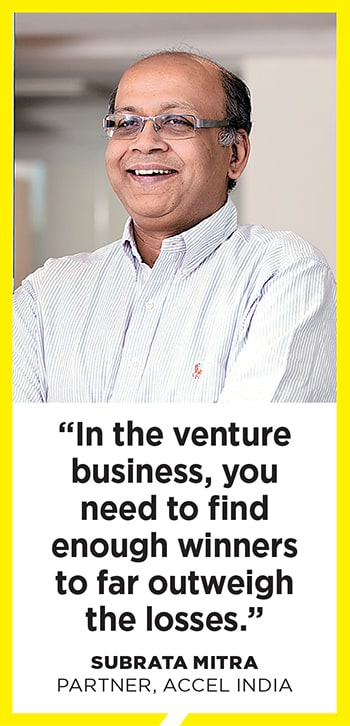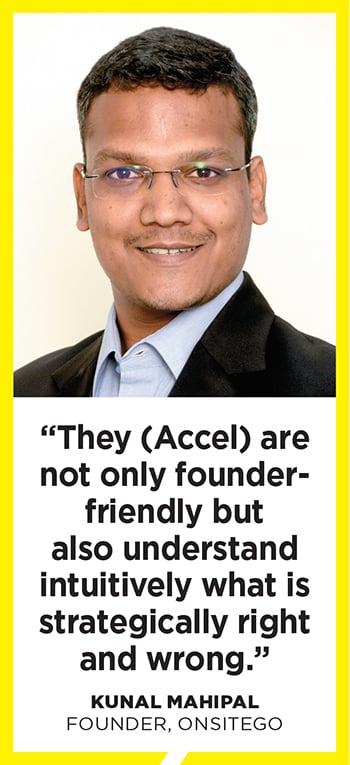Accel India: Decoding founders' mentality to spin success
Accel seeded the passion of entrepreneurs into its investing DNA to spot early winners in the consumer business. Its next big bet: SaaS unicorns


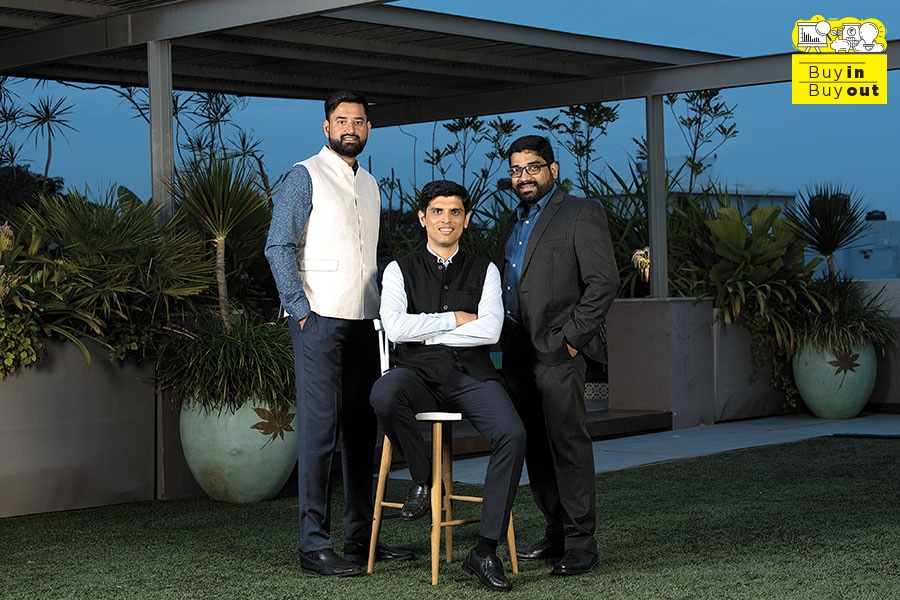 From left: Barath Shankar Subramanian, Abhinav Chaturvedi and Prayank Swaroop, partners at AccelImage: Hemant Mishra for Forbes India[br] Chennai, circa 2011: Shekhar Kirani had sniffed an untapped opportunity. Kirani, who joined global venture investment firm Accel as a partner the same year after stints with two Silicon Valley-based startups, knew the nuances and magic of the subscription business. Both his former companies (LightSurf and StarFish) made loads of money and got eventually sold to Motorola and VeriSign. So when the young venture capitalist (VC) started hunting for his maiden investment, SaaS (software as a service) turned out to be his first segment of choice. He zeroed in on Freshdesk, a SaaS-based social customer support startup co-founded by Girish Mathrubootham and Shanmugam Krishnasamy in 2010. “I knew what SaaS meant, and how powerful subscriptions could be,” he recalls.
From left: Barath Shankar Subramanian, Abhinav Chaturvedi and Prayank Swaroop, partners at AccelImage: Hemant Mishra for Forbes India[br] Chennai, circa 2011: Shekhar Kirani had sniffed an untapped opportunity. Kirani, who joined global venture investment firm Accel as a partner the same year after stints with two Silicon Valley-based startups, knew the nuances and magic of the subscription business. Both his former companies (LightSurf and StarFish) made loads of money and got eventually sold to Motorola and VeriSign. So when the young venture capitalist (VC) started hunting for his maiden investment, SaaS (software as a service) turned out to be his first segment of choice. He zeroed in on Freshdesk, a SaaS-based social customer support startup co-founded by Girish Mathrubootham and Shanmugam Krishnasamy in 2010. “I knew what SaaS meant, and how powerful subscriptions could be,” he recalls.
Kirani was keen to invest, but Mathrubootham had second thoughts. This was the ‘second’ problem for Kirani. Apart from Accel, the entrepreneur was in talks with two more investors. Mathrubootham was more likely to skip Accel. Reasons: He didn’t know the Accel brand or pedigree and one of the suitors was willing to give capital at a much lower dilution. Kirani was all set to lose his maiden deal.
Cut to late 2014 in Bengaluru. Abhinav Chaturvedi was about to turn adventurous. The young associate at Accel wanted to know how different an ‘exorbitant’ ₹250 hair cut was from a ‘normal mundane’ one. He landed up at one of the salons at Jayanagar. What got his attention was not a stylish haircut but the smooth and quick checkout experience of the product the salon was using. His inherent curiosity ensured he got the name of the company making the software product: ManageMySpa, a Hyderabad-based startup.Chaturvedi got in touch with founder Sudheer Koneru, got a hang of the business after multiple rounds of talk, and convinced Kirani to fly down to Hyderabad to meet the ManageMySpa team. The talks went well, except for a tiny issue. The founder didn’t need money. “When they came to meet us, we were not even looking for money,” recalls Koneru. The company was self-funded, and the founder was about to take $1 million from family and friends. There was another glitch. The Accel team told Koneru that ManageMySpa was doing a great job in India, but the founder should look at bigger global markets such as the US and Europe. Koneru was not convinced. “I was fine with whatever I was doing. I was not looking for a big outcome,” he recalls.
Cut to December 2020. Koneru gives India its last unicorn in a pandemic year. Zenoti, which was known as ManageMySpa till 2015, reportedly raised $160 million at a valuation of over $1 billion. The Series D round was led by private equity firm Advent International, and existing investors Tiger Global and Steadview Partners also participated. “I don’t think much about being a unicorn,” says Koneru. Zenoti, he lets on, is on a mission to transform the salon, spa and beauty industry. Founded in 2010, Zenoti gets 60 percent of revenues from the US, another 20 percent from the UK, India and West Asia pitch in with five percent, and the remaining 15 percent comes from the rest of the world.
For an entrepreneur who was content with his India operations in 2015, Koneru is living a bold dream. He, however, gives credit where it is due. “Had it not been for the Accel thing (seed investment in 2015), there’s no way we would have got bold and come here,” he confesses. “Taking money from Accel, he lets on, implied that we will focus on a larger outcome. And it has happened.”
Twelve years after entering India—in 2008 the American VC bought early-stage fund Erasmic and started India operations—Accel seems to have mastered the art of spotting potential unicorns early. From Myntra, Flipkart, Ola and Swiggy to Freshworks and now Zenoti, the VC fund comes in early—as early as seed stage—stays put with the startup by making multiple follow-on investments and then marches on towards the unicorn objective. “We don’t expect every company of ours to become a unicorn,” says Kirani, adding that he won’t mind having a few in each of the funds. The next set of unicorns, most likely, is going to come from Accel’s SaaS play.
Kirani decodes the method in the madness of spotting potential unicorns: A prepared thesis. Every year, he underlines, the partners take pains to understand how the world will be in five and ten years. “It’s driven by hypothesis,” he says. If the world is going to play out the way they foresee it will, then there are opportunities for investments in those categories.A decade back, Accel took a stab at the consumer segment. “We were the first to back a lot of ecommerce players,” Kirani says. Similarly, a couple of years back, no fund took SaaS seriously. “We knew SaaS is happening. Every company would need subscription management,” he points out. Accel made a seed investment in Chargebee as early as 2013. Last October, the Chennai- and San Francisco-based firm, which helps businesses manage subscription, billing and revenue operations, raised $55 million from a clutch of investors in which the existing ones—Steadview Capital and Tiger Global—also participated. The SaaS company is now valued at $509 million, and is among the next set of likely unicorns from the Accel stable (see box).
Another SaaS startup Accel is bullish on is web and mobile-testing platform BrowserStack. The courtship, interestingly, lasted over seven years before Accel invested in 2018. Kirani shares the back story. It all started in 2011 when the VC met the co-founders Ritesh Arora and Nakul Aggarwal. Kirani liked what the duo was doing, but the co-founders didn’t want outside money. “It was a cash-generating business, and I didn’t know how to get in,” he recalls. Kirani tried one more time this time the bait was getting the co-founders meet Accel’s US team. The idea was to help them grow faster. The meeting went well, both sides liked the idea, insights and plans. But again the conversation got stuck at one point: Arora and Aggarwal didn’t need dollars. The venture was profitable.
Kirani didn’t stop chasing. In 2018—by now he would have met the co-founders at least a dozen times—the VC made the final bid. The pitch was simple: Kirani and the Accel team have been helping the young founders over the last seven years in terms of connect and ideas. The time, Kirani thought, was ripe to end the free lunches. “You guys need to take some money from us,” he made a plea to the co-founders. “We can’t help you unless you take us on board.” The co-founders relented, and Accel pumped $50 million for a 10 percent stake (Accel India 6 percent and Accel US 4 percent), which helped the company scale globally. “Even today they are profitable, and have enough money in the bank,” Kirani smiles. Yes, VCs too chase entrepreneurs.
Investment experts are not surprised. They call it the ‘Founders’ Mentality’, which is inbuilt in the DNA of Accel in India. “What makes Accel different is its ability to spot the potential winners ahead of time,” says Anil Joshi, founder of Unicorn India Ventures. Persistence, he adds, is mostly a quality found in entrepreneurs. Two out of the four founding partners of Accel India—Subrata Mitra and Prashanth Prakash—were entrepreneurs to begin with.Mitra was the managing director of India operations for Tavant Technologies, which was acquired by a US-based mortgage solutions company in 2004. Previously, he was the founder of Firewhite, which was bought by Ubiquio, and later merged into Mobile Planet. Prakash, on the other hand, founded NetKraft.
As mentors, all the partners have shaped the culture of investing, which has a strong entrepreneur bias. Partners work closely with founders, especially during tough times. “I have seen them supporting founders in pivoting and encouraging them to work towards a bigger vision,” says Joshi, who has invested along with Accel in a couple of deals when he was with Mumbai Angels.
Staying ahead of the curve is also something that has helped Accel. “Accel was the first investor in Flipkart, and now the rest is history,” says Joshi. Identifying trends ahead of others and backing the founders are typical of Accel. Getting in early allows to work on mistakes and help build category leaders. Though it started with consumer internet, the firm placed early bets on SaaS, B2B and agritech startups. “These segments were quite offbeat. These were not sexy segments,” adds Joshi.
Even in so-called sexy consumer segments which need loads of money and have high cash burn—think Swiggy, Myntra and Flipkart—having deep pockets and conviction in the venture tilted the game in Accel’s favour. A decade back, people were beginning to access cheaper data and shop online. But what helped fuel this trend was more capital allowing for these businesses to influence consumer behaviour and drive stickiness. The reinforcement through discounts and loyalty programmes added to customer acquisition costs. With convenience, superior product experience, attractive offers and discounts, consumer behaviour shifted and stickiness got created. “All this is possible primarily because you can go long on these businesses,” says Radha Kizhanattam, partner at Unitus Ventures. “You have the capital to back them once you build conviction.” Accel’s partnership in India, she explains, comes with years of entrepreneurial and strong operating experience.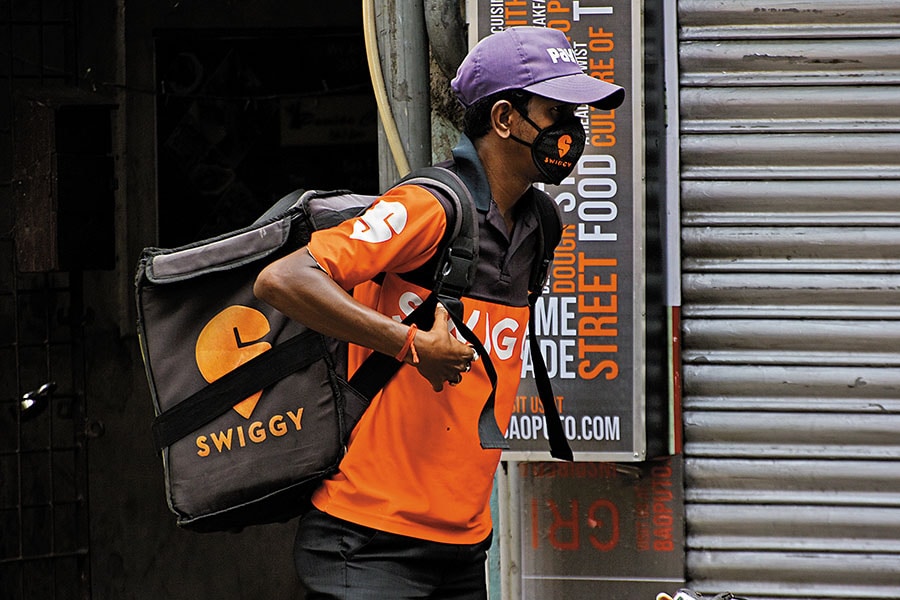 Accel seems to have mastered the art of spotting potential unicorns early. Swiggy, Myntra, Flipkart, Ola and Freshworks are some of the successful companies it has invested in
Accel seems to have mastered the art of spotting potential unicorns early. Swiggy, Myntra, Flipkart, Ola and Freshworks are some of the successful companies it has invested in
Image: Indranil Aditya / Nurphoto via Getty Images[br]Mitra, for his part, believes in playing a long innings. In the venture business, contends one of the founding partners at Accel, you’re trying to win big. “Therefore, failures are almost guaranteed. You need to find enough winners to far outweigh the losses.” Wins, he underlines, are truly non-linear and losses are linear. “That’s a big advantage. You don’t have to answer every question right,” he says. The context of investing has also changed. What didn’t work before or worked before might be different now. When Flipkart started, for instance, advertising on TV was the best way to spread the message. “Now everybody has a smartphone,” he says. The same question now might have a different answer or approach. Mitra’s new approach is reflected in giving the new generation of partners at Accel a blank canvas to paint their own picture. “We help our younger team members understand some of the nuances of the VC business,” he says. Finally, he stresses, they have their own views on how to win, and the path to take. Prayank Swaroop, who joined Accel as a partner in 2011, stuck to his convictions in 2019. The opportunity was to invest in Zetwerk, a B2B platform for custom manufacturing. “The big problem was that they were doing stuff in steel. It was difficult to estimate how much work in steel is done in India,” recalls Swaroop, who focuses on cybersecurity, developer tools, marketplaces, and SaaS investments. The partners asked a lot of questions. “Are you sure,” was the big question mark. Swaroop stayed firm in his conviction. He had his reasons: The business category is good, margins are healthy and the team was great. At that point, the VC asked himself one question: Does the team come first or the business model? He went with the former. “When you can find a perfect team and a perfect market, magic happens,” he says. Apart from Zetwerk, where Accel invested in March 2019, other investments led by Swaroop are Aavenir, Bizongo, Maverix, OnsiteGo, Securden, Sintel and Skeps. The role of a VC, he explains, is that of a coach. But one needs to don multiple hats. “At times, I am Ravi Shastri and at times Gary Kirsten.” First-time founders need a lot of help. “With them you have to be Shastri,” he says. Then there are companies that don’t need to be pushed. “With Zetwerk, I’m a Kirsten.”
Prayank Swaroop, who joined Accel as a partner in 2011, stuck to his convictions in 2019. The opportunity was to invest in Zetwerk, a B2B platform for custom manufacturing. “The big problem was that they were doing stuff in steel. It was difficult to estimate how much work in steel is done in India,” recalls Swaroop, who focuses on cybersecurity, developer tools, marketplaces, and SaaS investments. The partners asked a lot of questions. “Are you sure,” was the big question mark. Swaroop stayed firm in his conviction. He had his reasons: The business category is good, margins are healthy and the team was great. At that point, the VC asked himself one question: Does the team come first or the business model? He went with the former. “When you can find a perfect team and a perfect market, magic happens,” he says. Apart from Zetwerk, where Accel invested in March 2019, other investments led by Swaroop are Aavenir, Bizongo, Maverix, OnsiteGo, Securden, Sintel and Skeps. The role of a VC, he explains, is that of a coach. But one needs to don multiple hats. “At times, I am Ravi Shastri and at times Gary Kirsten.” First-time founders need a lot of help. “With them you have to be Shastri,” he says. Then there are companies that don’t need to be pushed. “With Zetwerk, I’m a Kirsten.”
For another young gun, Abhinav Chaturvedi, who joined Accel in 2012 and focuses on consumer, fintech and SaaS investments, the rule of the game is to play hard. The baggage of fear and failure, he reckons, is something that doesn’t allow you to hit the ball hard. Having led investments in startups such as Acko, Ally, Drip Capital, Stanza Living and UrbanCompany—the last is slated to be a unicorn soon—Chaturvedi believes in making bold bets. “The beauty of the venture businesses is that the large can be very large,” he says. If the previous large, he explains, is $1 billion or $5 billion, the new could be $100 billion. “You just need to hit the ball hard,” he says. The bottom line though is one needs to believe in the company, and founders.
Eight years back, Mathrubootham of Freshworks found out the essence of VC investing. The entrepreneur introduced Chargebee to Kirani. He thought it would make a nice investment for Accel. “Shekhar (Kirani) wasn’t fully convinced at that time,” recalls Mathrubootham. For Kirani, the question was: How big is this market? He was right as most of the SaaS billing was being cornered by the top guys. One argument made for investment was: Chargebee had a good team, it would definitely make money, and in a worst case scenario, Accel could exit. Kirani was still not convinced. “If I don’t believe in the company and I invest, I am wasting two, three years of the founders’ life,” he said. Accel eventually went on to invest in Chargebee, but only after Kirani was convinced about what the founders wanted to target. “We wanted to see clarity of thought on what the team would tackle in the financial services market,” recalls Kirani. The day, he lets on, Chargebee decided to go after subscription management for SaaS, Accel decided to invest.There was a priceless lesson for Mathrubootham. “We are not thinking about the end game,” he says. Early stage entrepreneurs, he lets on, tend to focus on the small things. The thought process is simple: Build 10, 20 features, get to a customer, then 10 customers and the next million. But that’s not how VCs think. “They go top down,” he says. In a cab business in Chennai, for instance, the question they would ask are: How many taxis are there in Chennai, and India? If one needs to own all, then how much one would have to pay per taxi driver to convert them? How much money does it take? “What I learnt from Shekhar is how to think that if everything goes according to plan, where is it going to end?” he says.
Kunal Mahipal, founder of Onsitego, which provides extended warranty and damage plans for devices and appliance, narrates another lesson he will never forget. In 2015, the after-sales services firm had just secured a seed round from Accel. At a celebration party in Bengaluru, Mahipal casually mentioned to Mahendran Balachandran—one of the founding partners at Accel India—that he didn’t like one of the clauses in the term sheet. The VC could have easily taken offence to a fledgling entrepreneur questioning the term-sheet after it was signed. Balachandran, though, was not. He was surprised that the clause skipped his attention too. At the peak of the party, he called up his legal team, and asked them to strike out the clause from the term sheet, and all others too in which it may have creeped in. “That moment was enough to cement my respect and trust in Accel,” recalls Mahipal. A former entrepreneur, after all, knows what it is to be in those shoes.
First Published: Jan 18, 2021, 11:14
Subscribe Now